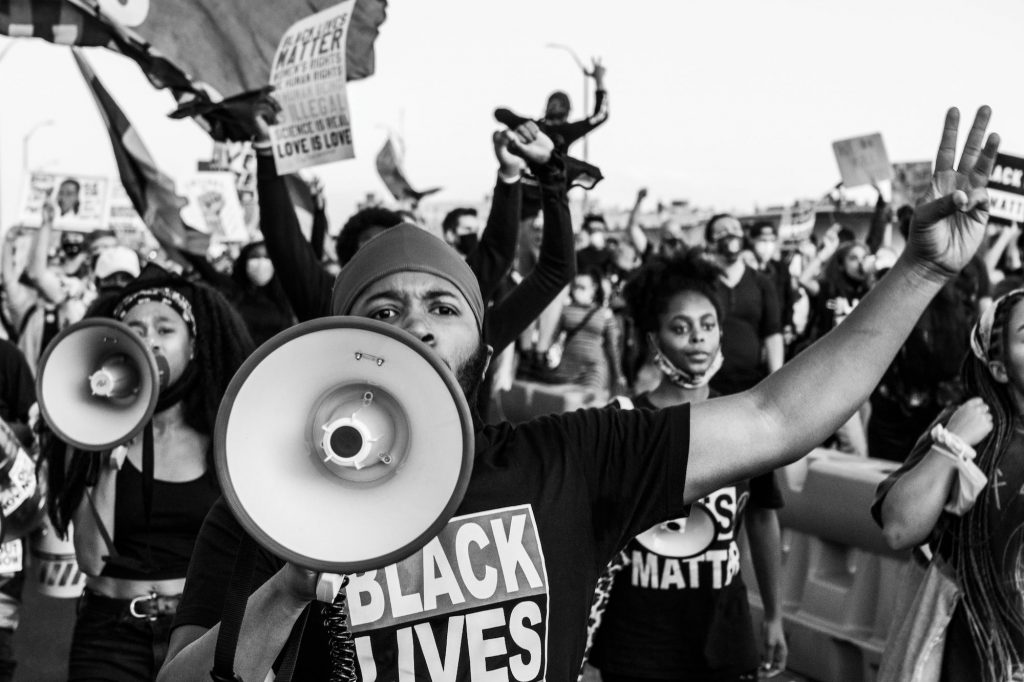This Black History Month, we invite you to submit articles, interviews, and art related to Black struggle and the fight against anti-Black racism. Submit your articles or ideas to [email protected].
Right now, the rights that Black people have won over the last quarter century are under attack. There are right-wing attacks on teaching the history of racism in schools, under the misnomer “critical race theory.” There are attacks on voting rights that will primarily disenfranchise communities of color. And while a year and a half ago, a mass movement was calling to defund the police, police budgets are booming; there is bipartisan consensus around the need for more policing and to be “tough on crime.” Meanwhile, the pandemic has disproportionately affected Black people, whose life expectancy has declined by three years since March 2020.
While Joe Biden and the Democrats came into the White House saying that Black Lives Matter and kneeling in kente cloth, they are presiding over a rollback of rights for Black people. It’s clear that under capitalism, all the rights we win can easily be taken away.
In order to co-opt and placate the movement, as the Democrats always do, the Biden administration has a diverse cabinet, including a Black woman as vice president, and may put a Black woman on the Supreme Court. But representation isn’t liberation. And representation within capitalism is meant to uphold a system that is anti-Black and systematically violent towards Black people.
But the lessons and the spirit of the Black Lives Matter movement have not been erased. The millions who mobilized have not forgotten that racism is systemic and deeply ingrained in the core of this country, and foundational to U.S. history. The fact that so many young people mobilized with this understanding is why the right wing now wants to obliterate all teaching of Black history from curricula — they’re scared that young people of all races will understand that racism is systemic and that we must rise up to fight it.
They’re also afraid that young people will understand that our destinies are tied to one another because capitalism exploits us all. They are afraid that we will understand systematic inequality as a vital tool for capitalist exploitation that hurts the whole working class and other oppressed communities. They are scared of the power of a united, integrated working class fighting alongside oppressed peoples, because they know we have the social power to overthrow their system.
The mass struggles in defense of Black lives in 2013, in 2014, and in many years leading up to the 2020 uprising is an expression of that growing consciousness. The Black Lives Matter movement against police violence and institutional racism may have ebbed, but it was not crushed — it will write new chapters of class struggle in U.S. history. In fact, Black struggle and Black resistance have already written among the most combative and radical chapters of class struggle in U.S. and world history.
As we wrote last year:
In every country where Black people were enslaved, Black people have risen up. Black people were the protagonists of the glorious Haitian revolution, defeating none other than one of the world’s most powerful imperialist armies — the French. In Brazil, Black people built quilombos— towns of escaped slaves, often numbering in the thousands, who organized attacks and helped other enslaved people escape. Black people are not just victims of racist capitalist brutality. Black people are the subjects of the most explosive struggle this country, and the world, have ever seen.
And this past year, as we’ve seen labor struggles arise in workplaces small and large, Black people play a central role in strikes and labor struggles, as has been the case throughout history — from the sit down strikes in Flint, Michigan in the 30s to the more recent Kellogg workers’ strike, and the Amazon unionization effort in Bessemer, Alabama. SEIU led a one-day demonstration called Strike for Black Lives, initiating a shutdowns of the port of Los Angeles. An official strike and a combative occupation led by the ILWU shut down the Port of Oakland. Rank and file members of SEIU, AFSME, and WGA formed organizations to expel the police from their unions.
We understand the struggle for Black lives to mean a struggle against capitalism. Capitalism is a system that promotes and profits from racism — from the lower wages paid to Black people to the semi-slave prison labor population in which Black people are disproportionately represented. Racism is not some bug in the system — it’s at the very core of capitalism.
Therefore, we believe we need to organize working-class and oppressed people for the revolutionary overthrow of this system. We hope we can exchange with you about this project and your ideas throughout this month and beyond.
This Black History Month, we want to highlight all of this: systemic racism and the struggle for Black liberation. We want to shine a light on the enemies of Black people and expose the capitalist parties and their attacks on Black people in the United States and around the world.
We want to publish stories about the activism you are engaging in in your community, or the expressions of systemic racism on a local, national, or international level. We invite you to submit writing, interviews, articles, and other media that highlight Black struggle to Left Voice at: [email protected].
We also invite you to attend a series of events this month, including a Black socialists meeting and an international rap cypher.











